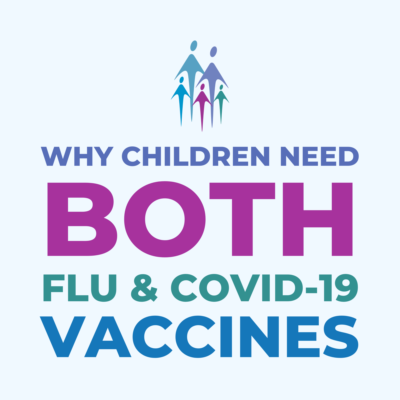
- Flu Prevention
- Science & Research
Why Children Need Both Flu & COVID-19 Vaccines

The following article is guest authored by Dr. Alexandria Yarborough, PharmD. She is a Pharmacy Manager in South Carolina and a Families Fighting Flu Advocate.
Although we are a nonprofit dedicated to flu, we see many similarities between COVID-19 and influenza.
Now that COVID-19 vaccines are available for children 5 and older, we encourage children to receive both vaccines. Read Dr. Alexandria Yarborough, PharmD’s expert advice on COVID-19 vaccination in children.
Healthcare professionals agree that there are many benefits to COVID-19 vaccination for children:
- The vaccine helps prevent kids from getting COVID-19: Although COVID-19 in children is usually milder than in adults, kids infected with the coronavirus can get severe lung infections, become very sick, and/or require hospitalization. This is especially important to remember in light of the developing variants.
- The vaccine helps prevent or reduce the spread of COVID-19: Like adults, children also can transmit the coronavirus if they’re infected, even when they have no symptoms. Getting the COVID-19 vaccine can protect the child and others, reducing the chance that they transmit the virus to others, including those who may be more susceptible.
- Getting vaccinated for COVID-19 can help stop other variants from emerging: Cases of COVID-19 are increasing among children, and the delta and omicron variants appear to be playing a role. Reducing the spread by getting vaccinated also reduces the virus’ chance to mutate into new variants that may be even more dangerous.
- Having your child vaccinated for COVID can help return to a more normal life: Getting vaccinated will also help keep children in school and participating in things they enjoy. Children exposed to the coronavirus who are vaccinated are less likely to get infected, and so are more likely to be able to continue participating in school, travel, and other activities.
They are safe:
- The FDA and CDC take vaccine safety precautions very seriously. They continue to examine the available clinical trial data before deciding whether to authorize vaccination among different age groups and monitor the vaccines carefully.
- Since April 2021, there have been more than a thousand reports of cases of myocarditis (inflammation of the heart muscle) and pericarditis (inflammation of the lining outside the heart) happening after some COVID-19 vaccinations in the United States.
- But, considering the hundreds of millions of COVID-19 vaccine doses that have been administered, these reports are very rare. The problem occurs more often in teens, young adults, and males. Myocarditis or pericarditis in almost all cases is mild and resolves quickly. Also, myocarditis is a much more common complication of having COVID-19 than from getting vaccinated. The benefit of the vaccine easily outweighs the risk of catching COVID-19.
- Seek medical attention right away if your child experiences chest pain, shortness of breath, or feelings of having a fast-beating, fluttering, or pounding heartbeat.
There are clear risks to COVID-19 in children:
- Children can have complications such as multisystem inflammatory syndrome in children (MIS-C) that may require intensive care or long-lasting symptoms that affect their health. The virus can cause death in children, although death is more common in adults.
- Similar to flu, vaccinated people are less likely to die and/or be hospitalized.
Can I get COVID-19 from my child?
Yes, it is possible for a child infected with the coronavirus to transmit COVID-19 to another person. Data from some studies suggest that young children may be less likely than older children and adults to spread the coronavirus to others, but it can still happen. It is not possible to get covid-19 from the vaccine.


